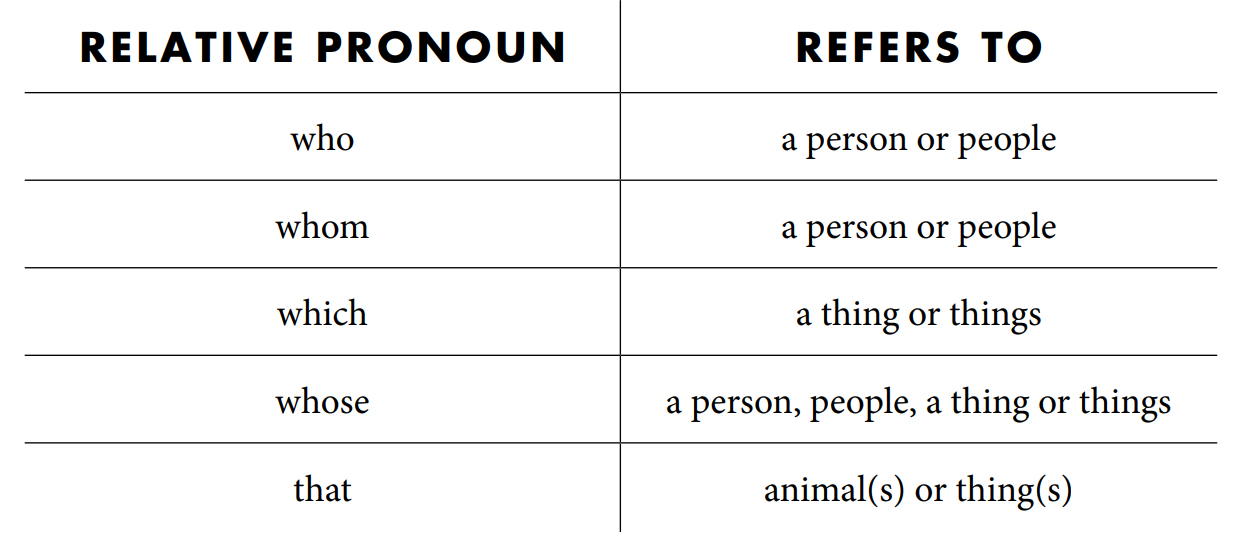Difference between revisions of "Language/English/Grammar/RELATIVE-PRONOUNS"
m (Quick edit) |
m (Quick edit) |
||
| (One intermediate revision by the same user not shown) | |||
| Line 1: | Line 1: | ||
[[File:English-Language-PolyglotClub.jpg|thumb]] | [[File:English-Language-PolyglotClub.jpg|thumb]] | ||
<div | <div class="pg_page_title"> RELATIVE PRONOUNS in English</div> | ||
__TOC__ | __TOC__ | ||
| Line 7: | Line 7: | ||
Who, whom, whose, which and that function as relative pronouns when they add further information to the things or people mentioned in the sentence. | Who, whom, whose, which and that function as relative pronouns when they add further information to the things or people mentioned in the sentence. | ||
[[File:English-Language-Relative Pronouns PolyglotClub.jpg]] | [[File:English-Language-Relative Pronouns PolyglotClub.jpg]] | ||
The difference between who and whom is that who may be the subject of a verb; it is also often used as an object although this is frowned upon. | The difference between who and whom is that who may be the subject of a verb; it is also often used as an object although this is frowned upon. | ||
| Line 19: | Line 17: | ||
• These are candidates whom we interviewed last week. | • These are candidates whom we interviewed last week. | ||
Whom is used only as the object of a verb. Both who and whom can be the object of a preposition but if the preposition comes before the pronoun, you must use whom. This is illustrated in the examples below. | Whom is used only as the object of a verb. Both who and whom can be the object of a preposition but if the preposition comes before the pronoun, you must use whom. This is illustrated in the examples below. | ||
| Line 32: | Line 29: | ||
• The shirt that Matthew bought has some stains on it. | • The shirt that Matthew bought has some stains on it. | ||
Note: American English favours the use of that over which while British English still uses both that and which. | Note: American English favours the use of that over which while British English still uses both that and which. | ||
| Line 49: | Line 45: | ||
===Relative Pronouns English Grammar - YouTube=== | ===Relative Pronouns English Grammar - YouTube=== | ||
<youtube>https://www.youtube.com/watch?v=As0h2-fzVME</youtube> | <youtube>https://www.youtube.com/watch?v=As0h2-fzVME</youtube> | ||
==Other Lessons== | |||
* [[Language/English/Grammar/Prepositions-of-Direction|Prepositions of Direction]] | |||
* [[Language/English/Grammar/The-Possessive-Case|The Possessive Case]] | |||
* [[Language/English/Grammar/POSSESSIVE-PRONOUNS|POSSESSIVE PRONOUNS]] | |||
* [[Language/English/Grammar/-After--as-an-adverb| After as an adverb]] | |||
* [[Language/English/Grammar/Homophones|Homophones]] | |||
* [[Language/English/Grammar/CONJUNCTIONS-→-Cause-and-Effect|CONJUNCTIONS → Cause and Effect]] | |||
* [[Language/English/Grammar/Across,-over-and-through|Across, over and through]] | |||
* [[Language/English/Grammar/Adverbs-of-Manner|Adverbs of Manner]] | |||
* [[Language/English/Grammar/Possible-Positions-of-Adverbs-in-a-Sentence|Possible Positions of Adverbs in a Sentence]] | |||
* [[Language/English/Grammar/Gender|Gender]] | |||
<span links></span> | |||
Latest revision as of 13:14, 27 March 2023
Grammar Rules[edit | edit source]
Who, whom, whose, which and that function as relative pronouns when they add further information to the things or people mentioned in the sentence.
The difference between who and whom is that who may be the subject of a verb; it is also often used as an object although this is frowned upon.
E.g.
• Isn’t that Shyla who objected to the proposal?
• These are candidates whom we interviewed last week.
Whom is used only as the object of a verb. Both who and whom can be the object of a preposition but if the preposition comes before the pronoun, you must use whom. This is illustrated in the examples below.
E.g.
• Whom/who did you speak to about this matter?
• To whom did you speak about this matter? The relative pronoun that can often be used instead of who, whom and which.
E.g.
• The shirt that Matthew bought has some stains on it.
Note: American English favours the use of that over which while British English still uses both that and which.
Video[edit | edit source]
Sources[edit | edit source]
Videos[edit | edit source]
Relative Pronouns & Clauses - English Grammar Lesson - YouTube[edit | edit source]
Relative Pronouns English Grammar - YouTube[edit | edit source]
Other Lessons[edit | edit source]
- Prepositions of Direction
- The Possessive Case
- POSSESSIVE PRONOUNS
- After as an adverb
- Homophones
- CONJUNCTIONS → Cause and Effect
- Across, over and through
- Adverbs of Manner
- Possible Positions of Adverbs in a Sentence
- Gender

